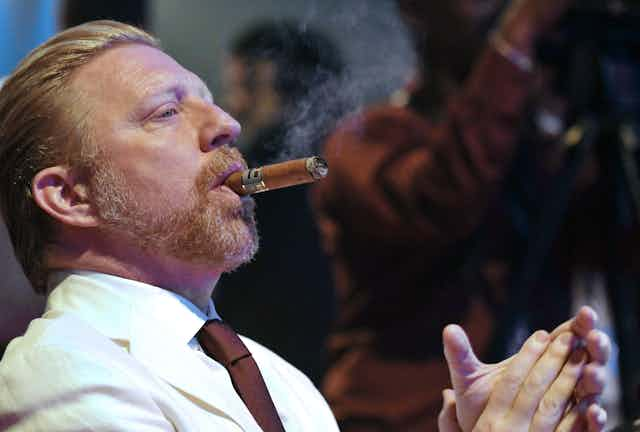Boris Becker is best known as a champion tennis player. But it has now emerged that he has a political life. Since April 27 2018 he has been the Central African Republic’s attaché to the European Union on sporting and humanitarian affairs.
At that moment, Becker became a “diplomatic agent”. This is a role for which Article 31 of the 1961 Vienna Convention on Diplomatic Relations provides diplomatic immunity from the criminal, civil and administrative jurisdiction of the “receiving state” – where the representative is on special mission. In Becker’s case, that apparently means the UK. The sports star, who was declared bankrupt in 2017 over debts to private bank Arbuthnot Latham & Co, now claims he is immune from being pursued for further payments. So, is he right? Is he protected by his diplomatic status?
Becker claims he should not to be subjected to legal process in the courts of any country for as long as he remains a recognised diplomatic agent. But some exceptions exist. For example, Article 31c of the convention provides that immunity doesn’t cover professional or commercial activities exercised by the diplomatic agent in the receiving state outside their official functions. So we need to decide what is meant by “official functions”.
Article 3 of the same convention clarifies this by setting out the general framework for diplomatic functions. The extent of this article has been interpreted as covering all other incidental actions which are indispensable for the performance of the general functions of a diplomat. At first glance, this broad interpretation seems to be in favour of Becker. But could international law really be stretched to the extent that a personal debt turns into a diplomatic issue? As much as we love sports veterans, are we comfortable seeing the “sanctity” of the rule of law challenged by them in this way?
National courts
But deciding when Article 31 can be activated is a complex matter. The article itself doesn’t set out any procedural provision as to when or how diplomatic immunity should be pleaded or established in national courts. These matters are therefore dealt with by national law – in this case the Diplomatic Privileges Act of 1964, which applies the relevant provisions of the convention in the UK.
In the UK, diplomatic immunity is conferred on all entitled members of a foreign mission who have been notified to, and accepted by, the Foreign and Commonwealth Office (FCO) as performing a diplomatic function. Immunity is dependent on rank, and ranges from immunity from criminal and civil and administrative jurisdiction to immunity for official acts only. The Diplomatic Protection Group of the Metropolitan Police or the FCO can advise if an offender has diplomatic immunity. Of course, the tweet in which Becker announced his affiliation to the Central African Republic can’t be considered sufficient evidence.
Becker’s case also clashes with the very nature and purpose of diplomatic protection, which is intended to protect “the right of the state” – in this example, the interests of the Central African Republic in the UK. It’s debatable how diplomatic protection for Becker protects the interests of the republic – or indeed anyone other than himself.
Old debts and new status
It’s worth noting that Becker is claiming retroactive protection under the convention for indiscretions that date back to before he was appointed a representative of the Central African Republic. That’s unusual in the law and raises the question: can diplomatic immunity be retroactive? Overall, if a defendant becomes entitled to immunity, they may raise it as a bar to proceedings already instituted against them and the courts must discontinue any such proceedings – if they accept their entitlement as a diplomat. However, in Becker’s case the proceeding was already concluded – it’s his debts that are outstanding. So it’s less clear if he can claim immunity.
The Foreign Office is therefore left with the following options: request Becker be withdrawn from the UK (and his creditors); ask that the Head of Mission waive immunity so that a prosecution can proceed (this seems the most common solution adopted in previous cases.
Becker is effectively making his debts the Central African Republic’s problem. And the nation may well conclude that having him represent its sporting interests just isn’t worth the trouble. It would not be unthinkable that, in order to avoid a diplomatic standoff with a global player such as the UK, the county would step back and waive Becker’s immunity.

